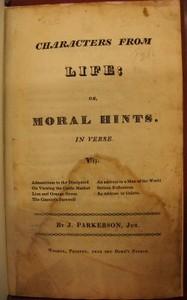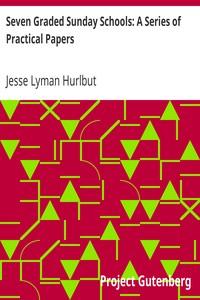Read this ebook for free! No credit card needed, absolutely nothing to pay.
Words: 193286 in 29 pages
This is an ebook sharing website. You can read the uploaded ebooks for free here. No credit cards needed, nothing to pay. If you want to own a digital copy of the ebook, or want to read offline with your favorite ebook-reader, then you can choose to buy and download the ebook.


: A Century of English Essays An Anthology Ranging from Caxton to R. L. Stevenson & the Writers of Our Own Time by Rhys Ernest Compiler Vaughan Lloyd Compiler - English literature; English essays
After that I had accomplished and finished divers histories, as well of contemplation as of other historical and worldly acts of great conquerors and princes, and also of certain books of ensamples and doctrine, many noble and divers gentlemen of this realm of England, came and demanded me, many and ofttimes, why that I did not cause to be imprinted the noble history of the Sancgreal, and of the most renowned Christian king, first and chief of the three best Christian and worthy, King Arthur, which ought most to be remembered among us Englishmen, before all other Christian kings; for it is notoriously known, through the universal world, that there be nine worthy and the best that ever were, that is, to wit, three Paynims, three Jews, and three Christian men. As for the Paynims, they were before the Incarnation of Christ, which were named, the first, Hector of Troy, of whom the history is common, both in ballad and in prose; the second, Alexander the Great; and the third, Julius Caesar, Emperor of Rome, of which the histories be well known and had. And as for the three Jews, which also were before the Incarnation of our Lord, of whom the first was Duke Joshua, which brought the children of Israel into the land of behest; the second was David, King of Jerusalem; and the third Judas Maccabeus. Of these three, the Bible rehearseth all their noble histories and acts. And, since the said Incarnation, have been three noble Christian men, stalled and admitted through the universal world, into the number of the nine best and worthy: of whom was first, the noble Arthur, whose noble acts I purpose to write in this present book here following; the second was Charlemagne, or Charles the Great, of whom the history is had in many places, both in French and in English; and the third, and last, was Godfrey of Boulogne, of whose acts and life I made a book unto the excellent prince and king, of noble memory, King Edward the Fourth.
DAME PRUDENCE ON RICHES
First, ye shuln geten 'em withouten great desire, by good leisure, sokingly, and not over hastily, for a man that is too desiring to get riches abandoneth him first to theft and to all other evils; and therefore saith Solomon: He that hasteth him too busily to wax rich, he shall be non innocent: he saith also, that the riches that hastily cometh to a man, soon and lightly goeth and passeth from a man, but that riches that cometh little and little, waxeth alway and multiplieth. And, sir, ye shuln get riches by your wit and by your travail, unto your profit, and that withouten wrong or harm doing to any other person; for the law saith: There maketh no man himself rich, if he do harm to another wight; that is to say, that Nature defendeth and forbiddeth by right, that no man make himself rich unto the harm of another person. And Tullius saith: That no sorrow, ne no dread of death, ne nothing that may fall unto a man, is so muckle agains nature as a man to increase his own profit to harm of another man. And though the great men and the mighty men geten riches more lightly than thou, yet shalt thou not ben idle ne slow to do thy profit, for thou shalt in all wise flee idleness; for Solomon saith: That idleness teacheth a man to do many evils; and the same Solomon saith: That he that travaileth and busieth himself to tillen his lond, shall eat bread, but he that is idle, and casteth him to no business ne occupation, shall fall into poverty, and die for hunger. And he that is idle and slow can never find convenable time for to do his profit; for there is a versifier saith, that the idle man excuseth him in winter because of the great cold, and in summer then by encheson of the heat. For these causes, saith Caton, waketh and inclineth you not over muckle to sleep, for over muckle rest nourisheth and causeth many vices; and therefore saith St. Jerome: Doeth some good deeds, that the devil, which is our enemy, ne find you not unoccupied, for the devil he taketh not lightly unto his werking such as he findeth occupied in good werks.
Then thus in getting riches ye musten flee idleness; and afterward ye shuln usen the riches which ye ban geten by your wit and by your travail, in such manner, than men hold you not too scarce, ne too sparing, ne fool-large, that is to say, over large a spender; for right as men blamen an avaricious man because of his scarcity and chinchery, in the same wise he is to blame that spendeth over largely; and therefore saith Caton: Use the riches that thou hast ygeten in such manner, that men have no matter ne cause to call thee nother wretch ne chinch, for it is a great shame to a man to have a poor heart and a rich purse; he saith also: The goods that thou hast ygeten, use 'em by measure, that is to sayn, spend measureably, for they that folily wasten and despenden the goods that they han, when they han no more proper of 'eir own, that they shapen 'em to take the goods of another man. I say, then, that ye shuln flee avarice, using your riches in such manner, that men sayen not that your riches ben yburied, but that ye have 'em in your might and in your wielding; for a wise man reproveth the avaricious man, and saith thus in two verse: Whereto and why burieth a man his goods by his great avarice, and knoweth well that needs must he die, for death is the end of every man as in this present life? And for what cause or encheson joineth he him, or knitteth he him so fast unto his goods, that all his wits mowen not disseveren him or departen him fro his goods, and knoweth well, or ought to know, that when he is dead he shall nothing bear with him out of this world? and therefore saith St. Augustine, that the avaricious man is likened unto hell, that the more it swalloweth the more desire it hath to swallow and devour. And as well as ye wold eschew to be called an avaricious man or an chinch, as well should ye keep you and govern you in such wise, that men call you not fool-large; therefore, saith Tullius: The goods of thine house ne should not ben hid ne kept so close, but that they might ben opened by pity and debonnairety, that is to sayen, to give 'em part that han great need; ne they goods shoulden not ben so open to be every man's goods.
Afterward, in getting of your riches, and in using of 'em, ye shuln alway have three things in your heart, that is to say, our Lord God, conscience, and good name. First ye shuln have God in your heart, and for no riches ye shuln do nothing which may in any manner displease God that is your creator and maker; for, after the word of Solomon, it is better to have a little good, with love of God, than to have muckle good and lese the love of his Lord God; and the prophet saith, that better it is to ben a good man and have little good and treasure, than to be holden a shrew and have great riches. And yet I say furthermore, that ye shulden always do your business to get your riches, so that ye get 'em with a good conscience. And the apostle saith, that there nis thing in this world, of which we shulden have so great joy, as when our conscience beareth us good witness; and the wise man saith: The substance of a man is full good when sin is not in a man's conscience. Afterward, in getting of your riches and in using of 'em, ye must have great business and great diligence that your good name be alway kept and conserved; for Solomon saith, that better it is and more it availeth a man to have a good name than for to have great riches; and therefore he saith in another place: Do great diligence in keeping of thy friends and of thy good name, for it shall longer abide with thee than any treasure, be it never so precious; and certainly he should not be called a gentleman that, after God and good conscience all things left, ne doth his diligence and business to keepen his good name; and Cassiodore saith, that it is a sign of a gentle heart, when a man loveth and desireth to have a good name. And therfore saith Seint Augustyn, that ther ben two thinges that ben necessarie and needful; and that is good conscience and good loos; that is to sayn, good conscience in thin oughne persone in-ward, and good loos of thin neghebor out-ward. And he that trusteth him so muckle in his good conscience, that he despiseth or setteth at nought his good name or los, and recketh not though he kept not his good name, n'is but a cruel churl.
OF PAINTING THE FACE
HAMLET'S ADVICE TO THE PLAYERS
Speak the speech, I pray you, as I pronounced it to you, trippingly on the tongue: but if you mouth it, as many of your players do, I had as lief the town-crier spoke my lines. Nor do not saw the air too much with your hand, thus; but use all gently, for in the very torrent, tempest, and, as I may say, whirlwind of your passion, you must acquire and beget a temperance that may give it smoothness. O, it offends me to the soul to hear a robustious periwig-pated fellow tear a passion to tatters, to very rags, to split the ears of the groundlings, who, for the most part, are capable of nothing but inexplicable dumb-shows and noise: I would have such a fellow whipped for o'erdoing Termagant; it out-herods Herod: pray you, avoid it. Be not too tame neither, but let your own discretion be your tutor: suit the action to the word, the word to the action; with this special observance, that you o'erstep not the modesty of nature: for anything so overdone is from the purpose of playing, whose end, both at the first and now, was and is, to hold, as 'twere, the mirror up to nature; to show virtue her own feature, scorn her own image, and the very age and body of the time his form and pressure. Now this overdone or come tardy off, though it make the unskilful laugh, cannot but make the judicious grieve; the censure of the which one must in your allowance o'erweigh a whole theatre of others. O, there be players that I have seen play, and heard others praise, and that highly, not to speak it profanely, that neither having the accent of Christians nor the gait of Christian, pagan, nor man, have so strutted and bellowed, that I have thought some of nature's journeymen had made men, and not made them well, they imitated humanity so abominably. O, reform it altogether. And let those that play your clowns speak no more than is set down for them: for there be of them that will themselves laugh, to set on some quantity of barren spectators to laugh too, though in the mean time some necessary question of the play be then to be considered: that's villainous, and shows a most pitiful ambition in the fool that uses it.
OF ADVERSITY
OF TRAVEL
Travel, in the younger sort, is a part of education; in the elder, a part of experience. He that travelleth into a country before he hath some entrance into the language, goeth to school, and not to travel. That young men travel under some tutor, or grave servant, I allow well; so that he be such a one that hath the language and hath been in the country before; whereby he may be able to tell them what things are worthy to be seen in the country where they go; what acquaintances they are to seek; what exercises or discipline the place yieldeth. For else young men shall go hooded, and look abroad little. It is a strange thing that in sea-voyages, where there is nothing to be seen but sky and sea, men should make diaries, but in land-travel, wherein so much is to be observed, for the most part they omit it; as if chance were fitter to be registered than observation. Let diaries, therefore, be brought in use. The things to be seen and observed are: the courts of princes, specially when they give audience to ambassadors; the courts of justice, while they sit and hear causes, and so of consistories ecclesiastic; the churches and monasteries, with the monuments which are therein extant; the walls and fortifications of cities and towns, and so the havens and harbours; antiquities and ruins; libraries; colleges, disputations, and lectures, where any are; shipping and navies; houses and gardens of state and pleasure, near great cities; armories; arsenals; magazines; exchanges; burses; warehouses; exercises of horsemanship, fencing, training of soldiers, and the like; comedies, such whereunto the better sort of persons do resort; treasuries of jewels and robes; cabinets and rarities; and, to conclude, whatsoever is memorable in the places where they go. After all which the tutors or servants ought to make diligent enquiry. As for triumphs, masques, feasts, weddings, funerals, capital executions, and such shews, men need not to be put in mind of them; yet are they not to be neglected. If you will have a young man to put his travel into a little room, and in short time to gather much, this you must do. First, as was said, he must have some entrance into the language, before he goeth. Then he must have such a servant, or tutor, as knoweth the country, as was likewise said. Let him carry with him also some card or book describing the country where he travelleth; which will be a good key to his enquiry. Let him keep also a diary. Let him not stay long in one city or town; more or less as the place deserveth, but not long: nay, when he stayeth in one city or town, let him change his lodging from one end and part of the town to another; which is a great adamant of acquaintance. Let him sequester himself from the company of his countrymen, and diet in such places where there is good company of the nation where he travelleth. Let him, upon his removes from one place to another, procure recommendation to some person of quality residing in the place whither he removeth; that he may use his favour in those things he desireth to see or know. Thus he may abridge his travel with much profit. As for the acquaintance which is to be sought in travel; that which is most of all profitable is acquaintance with the secretaries and employed men of ambassadors; for so in travelling in one country he shall suck the experience of many. Let him also see and visit eminent persons in all kinds, which are of great name abroad; that he may be able to tell how the life agreeth with the fame. For quarrels, they are with care and discretion to be avoided: they are commonly for mistresses, healths, place, and words. And let a man beware how he keepeth company with choleric and quarrelsome persons; for they will engage him into their own quarrels. When a traveller returneth home, let him not leave the countries where he hath travelled altogether behind him, but maintain a correspondence by letters with those of his acquaintance which are of most worth. And let his travel appear rather in his discourse than in his apparel or gesture; and in his discourse, let him be rather advised in his answers than forwards to tell stories; and let it appear that he doth not change his country manners for those of foreign parts, but only prick in some flowers of that he hath learned abroad into the customs of his own country.
OF WISDOM FOR A MAN'S SELF
Free books android app tbrJar TBR JAR Read Free books online gutenberg
More posts by @FreeBooks


: Non dir quattro se non l'hai nel sacco: Commedia in un atto by Giacosa Giuseppe - Italian drama IT Teatro in prosa







